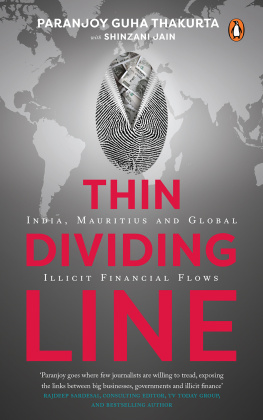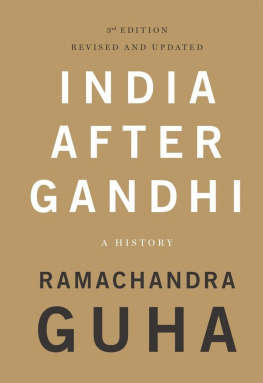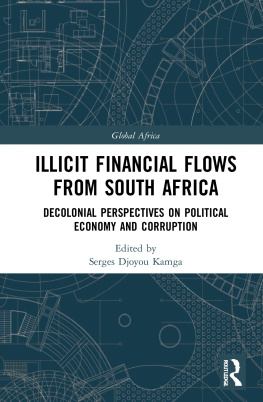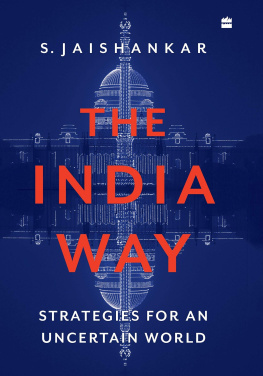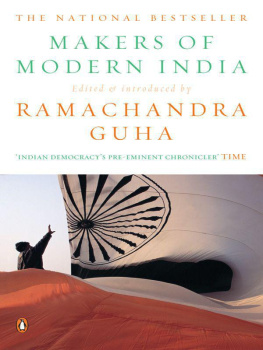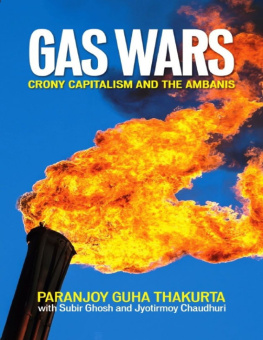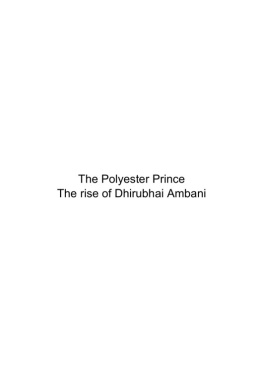Advance Praise for the Book
Paranjoy goes where few journalists are willing to tread, exposing the links between big businesses, governments and illicit finance. In the process, he rips the mask off a nexus that has thrived under weak regulatory mechanisms and a compromised system. For us journalists, Paranjoys investigative work is a reminder of that old saying: Journalism is printing what someone else does not want printed, all else is PR.
RAJDEEP SARDESAI, CONSULTING EDITOR, TV TODAY GROUP, AND BESTSELLING AUTHOR
Paranjoy Guha Thakurta is Indias pre-eminent investigative journalist who brings his economics background to bear on his analysis. I dont always agree with his views on post-1991 economic policies, but he always makes a compelling argument that cannot be brushed aside easily. In this book he has taken the issue of tax havens and illicit financial flows both into and out of India and its pernicious impacts head-on. He makes his case with passion and it is obvious that this has been extensively researched. Over the past decade, a number of steps have been taken by successive governments to deal with this menace but, clearly, he feels strongly that much more needs to be done. On this there can be no disagreement whatsoever.
JAIRAM RAMESH, INDIAN ECONOMIST AND POLITICIAN
Thin Dividing Line reveals the dark world of illicit money and the many channels through which it flows within countries and across borders. The focus of the book is India and how black money has remained largely untamed in spite of several official pronouncements to eliminate it. The authors have not ignored the international context of black money and the way it has been tackled in different countries. Engagingly written, the book provides a peek into the evolution of the controversial double-tax avoidance treaty with Mauritius, the modus operandi at the many tax havens in different parts of the world, the use of participatory notes enabling foreign investors to operate in Indian stock markets behind a veil of secrecy, and the financial controversies surrounding the Indian Premier League and the Vodafone tax case. The book does not fail to notice the many recent accounting policy initiatives to curb illicit financial transactions and encourage transparency. But the authors considered opinion is that these measures are a work in progress and a lot more needs to be done.
A.K. BHATTACHARYA, EDITORIAL DIRECTOR, BUSINESS STANDARD
There is a very thinalmost non-existentdividing line between tax evasion and tax avoidance. Through eleven chapters in this well-researched book, Paranjoy Guha Thakurta and his co-author have made an earnest attempt to sketch the different territories of illicit finance, map the routes of the money flow, and pencil the elusive dividing line.
To their credit, this has been done without being sensational. Often, fiction takes over on reportage of tax evasion and money laundering, as many tend to exaggerate the truth and present facts and figures in such a way that it transforms an investigative journalist into Hercule Poirot and the news report into a detective novel. Guha Thakurta has meticulously avoided this.
From the history to the evolution of tax havens in the different geographies across the world, the 2001 stock-market scandal, the sleaze beneath the aura and glamour of the Indian Premier League, the Vodafone retrospective taxation issue, the General Anti-Avoidance Rule and different capital market instruments that are being allegedly used to launder moneythis is an interesting account of a shadow economy and the damage it can inflict on all of us.
The issues dealt with in this book are not new, but Guha Thakurta, with his four-decade-long journalistic experience, has woven a fascinating story, full of anecdotes, data and already-published news reports. In the process, he has busted a few myths and discovered new realities.
TAMAL BANDYOPADHYAY, CONSULTING EDITOR, MINT , AND ADVISER, STRATEGY, BANDHAN BANK LTD
Thin Dividing Line is a very timely and important book that makes a huge contribution to the topic of tax havens and how they rob developing countries of much-needed tax revenues for providing essential services to the poor and how they fuel inequality. It points out that there is a thin dividing line between tax avoidance (legal) and tax evasion (illegal) and that the line is so thin that it is virtually non-existent.
NISHA AGRAWAL, CEO, OXFAM INDIA
List of Abbreviations
| 2G | Second-generation telecommunications spectrum |
| AAR | Authority on Advance Rulings |
| ADAG | Anil Dhirubhai Ambani Group |
| ADR | Association for Democratic Reforms |
| AEOI | Automatic Exchange of Information |
| AHHPL | Anand Heritage Hotels Private Limited |
| AIE | Automatic Information Exchange |
| AIG | American International Group |
| AML | Anti-Money Laundering |
| ASSOCHAM | Associated Chambers of Commerce and Industry of India |
| BCCI | Board of Control for Cricket in India |
| BEPS | Base Erosion and Profit Shifting |
| BIPA | Bilateral Investment Promotion Agreement |
| BJP | Bharatiya Janata Party |
| BSE | Bombay Stock Exchange |
| CBDT | Central Board of Direct Taxes |
| CBGA | Centre for Budget and Governance Accountability |
| CBI | Central Bureau of Investigation |
| CGP | CGP Investment (Holdings) Limited |
| DOJ | United States Department of Justice |
| DTAA | Double-Taxation Avoidance Agreement |
| DTAC | Double-Taxation Avoidance Convention |
| ED | Enforcement Directorate |
| EOI | Exchange of Information |
| EU | European Union |
| FATCA | Foreign Account Tax Compliance Act, 2010 |
| FATF | Financial Action Task Force |
| FBI | Federal Bureau of Investigation |
| FCRA | Foreign Contribution (Regulation) Act, 1976 |
| FDI | Foreign Direct Investment |
| FEMA | Foreign Exchange Management Act, 1999 |
| FERA | Foreign Exchange Regulation Act, 1973 |
| FfD3 | Third International Conference on Financing for Development |
| FII | Foreign Institutional Investor |
| FIPB | Foreign Investment Promotion Board |
| FIU | Financial Intelligence Unit |
| FPI |

